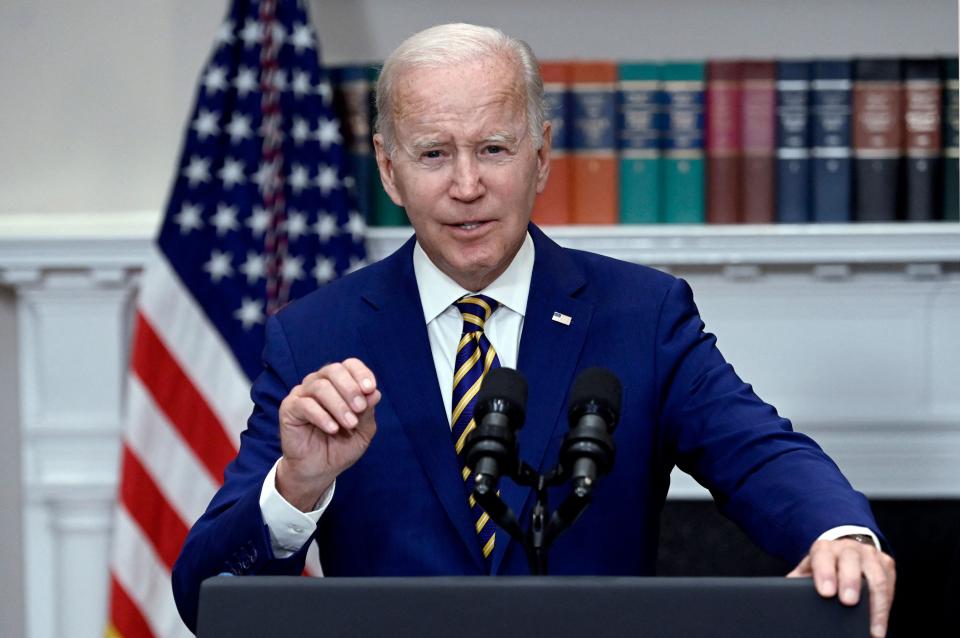Biden's student loan forgiveness is costly for taxpayers and bad for higher education
- Oops!Something went wrong.Please try again later.
- Oops!Something went wrong.Please try again later.
- Oops!Something went wrong.Please try again later.
It’s an all-too-familiar Washington story: A response to an emergency is extended long after the crisis that precipitated it has passed, which then creates the sort of mischief the nation's capital swamp is famous for.
We're seeing that now as President Joe Biden announced Wednesday he will cancel $10,000 in student federal loan debt for borrowers who make less than $125,00 per year and up to $20,000 for low-income borrowers who received Pell Grants. He also extended a moratorium on loan repayments until January.
By doing so, Biden is severely abusing executive power, undermining Congress and burdening American taxpayers.
The suspension of student loan payments was justified when COVID-19 hit full force in early 2020 and huge chunks of the economy were shut down by the pandemic and by government mandate. But politics has taken over the debate. Now, we’re faced with a situation that could do real harm to the economy, undermine whatever is left of the integrity of higher education and, most important, deal a nasty blow to social fairness and trust.
A huge loss to the federal government and taxpayers
The moratorium, which began under President Donald Trump, was extended twice by him and now five more times by Biden since he took office in January 2021.
Why another moratorium? The pandemic is no longer shutting down the economy.
Biden's forgiveness is a good start: But it falls short for borrowers like me
To be blunt, short term, it smacks of vote buying for the November elections. And questions have been raised about Biden's legal authority to cancel student debt.
Senate Majority Leader Chuck Schumer claimed Biden could cancel student debt with a "flick of the pen."
To the contrary, House Speaker Nancy Pelosi stated, "people think that the president of the United States has the power for debt forgiveness; he does not.”
Back to school: Strangers are spying on your child. And schools are paying them to do it.

Student debt forgiveness falls under Congress' responsibility.
The moratorium has already cost the federal treasury more than $100 billion in lost revenue, which has meant that Uncle Sam has been making up the shortfall by printing more money. We know where that has led us.
Indeed, Larry Summers, the former Treasury secretary under President Bill Clinton and chief economic adviser under President Barack Obama, noted that the pause in loan repayments is "highly problematic" and permits short-term spending that raises “inflation pressures.”
Canceling $10,000 of debt per student would cost our taxpayer-funded federal government more than $300 billion in lost future revenues. Doing away with all student debt would cost more than $1.6 trillion.
A handout to better-off Americans
But these loan payment suspensions – and the ultimate far-left ambition of wiping out all student debt – also have ugly social-justice consequences.
According to a report by the Brookings Institution, a left-of-center think tank, student loan debt is concentrated "among high-wealth households and loan forgiveness is regressive whether measured by income, educational attainment, or wealth."
Opinion alerts: Get columns from your favorite columnists + expert analysis on top issues, delivered straight to your device through the USA TODAY app. Don't have the app? Download it for free from your app store.
In other words, because of its regressive nature, the moratorium – and any debt forgiveness – is a handout to better-off Americans and offers the least relief to our neediest citizens.
Let’s cut to the chase here. Most Americans don’t have a college degree, and most of these citizens are in lower- to middle-income brackets. Why should they subsidize better-off Americans?
How is that fair?
Canceling loans mocks the millions of students and their families who scrimped and saved for college or who borrowed and paid back their loans.
Ingrid Jacques: 'Forgiving' student loans isn't motivated by kindness. It's all about cold, hard politics.
Subsidizing institutions of higher learning
And there’s an additional facet that needs to be exposed and dealt with: The whole government student loan program is a massive subsidy – an enormous giveaway – to institutions of higher learning. They learned long ago that the easy availability of loans means they can keep raising tuition and other fees.
And students and parents end up taking on more debt.
This is a key reason college and university sticker prices for decades have risen as much as four times the rate of inflation. Student loans were originally meant to help students get an affordable education. While many factors play into the sharp increases in college costs, policies enacted by the government meant to restrict the financial burden on students have only developed a leverage point for institutions to increase tuition.
New study of American opinions: Ideological mobs have us running scared. Time to stand up for ourselves.
A study by researchers from the Federal Reserve Bank of New York, Brigham Young University and Harvard found a tuition increase of about “$0.64 for every dollar increase of the subsidized federal loan maximum.”

This means that the more willing the government is to provide financial aid to make college affordable, the more colleges would increase tuition due to the increased access to more financial assistance.
Biden's debt cancellation is misguided.
Simple economics explains it. Simple fairness demands it.
Steve Forbes is chairman and editor-in-chief of Forbes Media. Follow him on Twitter: @SteveForbesCEO
You can read diverse opinions from our Board of Contributors and other writers on the Opinion front page, on Twitter @usatodayopinion and in our daily Opinion newsletter. To respond to a column, submit a comment to letters@usatoday.com.
This article originally appeared on USA TODAY: Student loan forgiveness: Why Biden’s debt relief is bad for taxpayers

